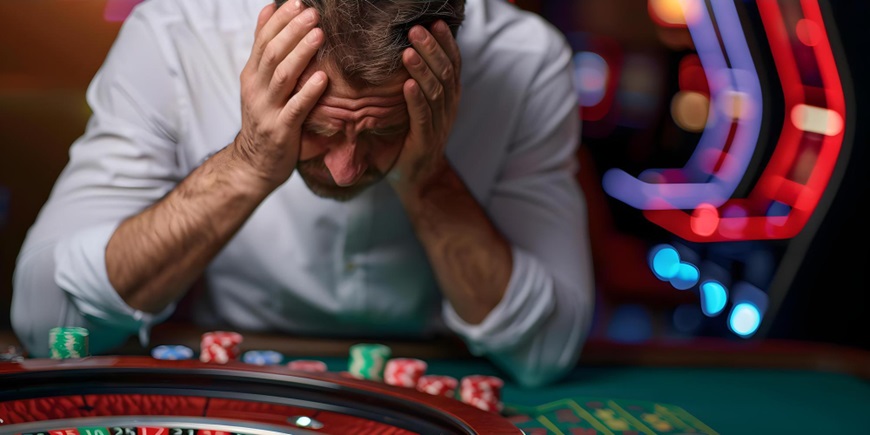 |
|
|
 |
 |
|
|
 |
How to Recognize Problem Gambling

 |
Recognizing problem gambling involves observing changes in behavior that may signal a more serious issue. It is important to be aware of subtle shifts in habits as well as visible signs of financial distress. Early detection of warning signs is crucial in assisting individuals who may be struggling with gambling addiction. By understanding the nuanced ways in which problem gambling can manifest, one can support those affected and help them seek appropriate help and treatment.Recognizing problem gambling involves observing changes in behavior that may signal a more serious issue. It is important to be aware of subtle shifts in habits as well as visible signs of financial distress. Early detection of warning signs is crucial in assisting individuals who may be struggling with gambling addiction. By understanding the nuanced ways in which Meta888 problem gambling can manifest, one can support those affected and help them seek appropriate help and treatment.
Warning Signs of Problem Gambling
Recognizing the warning signs of problem gambling is essential for individuals concerned about their gambling behavior. One significant indicator is when gambling starts to take precedence in one’s life, overshadowing responsibilities and relationships. Signs to watch out for include persistent thoughts about gambling, dishonesty about gambling habits, and feelings of restlessness or irritability when attempting to reduce gambling activities.
Furthermore, behaviors such as chasing losses, borrowing money for gambling purposes, or neglecting self-care can indicate potential gambling issues. It’s advisable to monitor gambling frequency and expenditure to gauge the impact of these habits. Seeking help and support early on can be instrumental in preventing the escalation of gambling-related problems.
Behavioral Changes to Watch For
Recognizing the warning signs of problem gambling is crucial, and it’s important to be vigilant for behavioral changes that could indicate a deeper issue. Watch for increased secrecy surrounding gambling activities, heightened irritability when not gambling, and frequent mood swings.
A decline in work or school performance due to gambling preoccupation is another red flag to be aware of. Changes in social behavior, such as distancing from loved ones or dishonesty about gambling, may also signal a problem.
Moreover, if there’s an uptick in borrowing money or selling personal items to finance gambling, intervention may be necessary. Monitoring these behavioral shifts can aid in early detection of problem gambling and mitigate further harm.
Financial Red Flags
Financial red flags can be indicators of potential gambling issues. Common warning signs include frequent borrowing of money, maxing out credit cards, and taking out high-interest loans to support gambling habits. Neglecting bills and basic expenses in favor of gambling, continuously seeking financial assistance from others, and unexplained drops in bank account balances are also concerning behaviors.
Secretive or defensive attitudes towards financial matters can suggest a problem. If you observe these red flags in yourself or someone you know, seeking help to address the underlying gambling problem is advisable to prevent further escalation.
Impact on Relationships
When problem gambling becomes a concern, it can have a significant impact on relationships. Loved ones may experience feelings of neglect or abandonment as your attention shifts towards gambling activities. Trust within the relationship may deteriorate as you may resort to dishonesty regarding your gambling behavior and financial losses.
Disputes over money and the time spent on gambling can escalate, straining the bonds with family and friends. Those close to you may feel a sense of helplessness or frustration, unsure of how to support you in breaking free from the gambling cycle.
Intimacy and effective communication may suffer as the addiction consumes more of your time and mental space. Identifying these signs early on and seeking assistance can help prevent further harm to your relationships and open the path to healing and recovery.
Denial and Rationalization
When dealing with problem gambling and its effects on relationships, individuals often experience stages of denial and rationalization. Denial involves downplaying the harmful outcomes of gambling behavior, while rationalization entails justifying continued gambling despite evident issues.
Common rationalizations include claims of being able to quit at any time or attributing losses to temporary bad luck. It’s crucial to acknowledge these defense mechanisms and objectively evaluate the true impact of gambling on one’s life and relationships.
Seeking Professional Help
If you’re experiencing difficulties in managing your gambling habits and see negative impacts on your life and relationships, seeking professional help is a vital step in regaining control. Professional help can be accessed through avenues such as therapy, counseling, or support groups tailored for individuals dealing with gambling addiction.
A trained professional can equip you with effective tools and strategies to address the underlying causes of your gambling behavior and develop healthier coping mechanisms. They can also offer valuable insights and support as you navigate the recovery process.
Supporting a Loved One
Supporting a loved one who’s facing challenges with problem gambling requires empathy and understanding. It’s important to maintain open communication and assure them of your support without resorting to blame or shame. Encourage them to seek professional help through counseling or support groups.
Establish clear boundaries to safeguard yourself from potential negative consequences of their gambling habits. Offer positive reinforcement for their efforts to seek assistance and acknowledge any progress they make. Remember to prioritize self-care, as supporting someone with a gambling issue can be emotionally draining.
Your assistance can play a significant role in their recovery journey.
Conclusion
If you notice warning signs like gambling taking over your life, behavioral changes, financial red flags, strained relationships, or denial, it may be time to seek help. Remember, problem gambling can have serious consequences on your well-being and relationships. Don’t hesitate to reach out to a professional for support and guidance. You deserve to live a healthy and balanced life free from the harmful effects of gambling addiction.
 |
 |
       |
 |
|